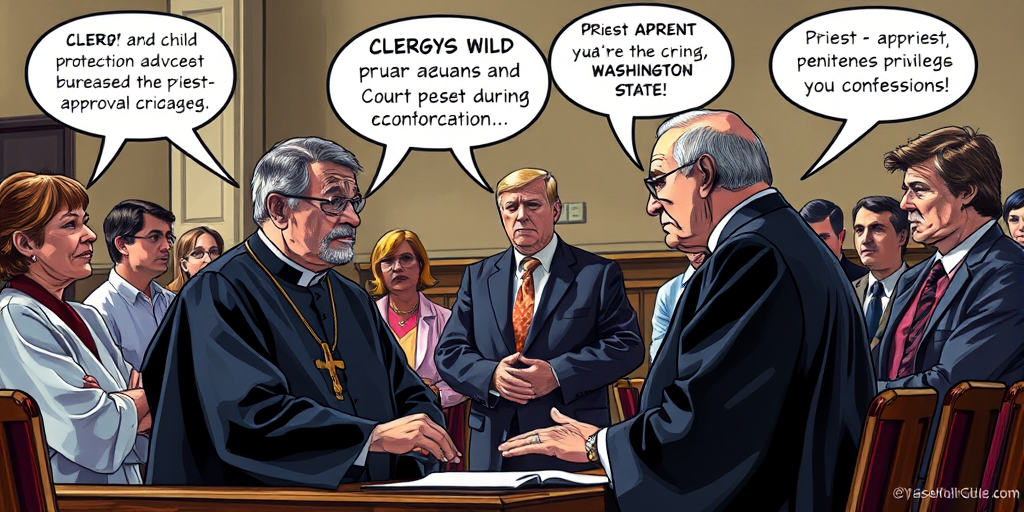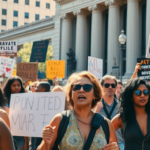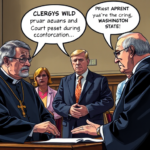Washington State Resolves Dispute Over Child Abuse Reporting by Clergy
Washington State recently concluded a contentious debate over Senate Bill 5375, a law requiring clergy members to report incidents of child abuse, even if discovered through confidential religious rites. This law, signed in May 2025, positioned clergy as mandatory reporters of child sexual and physical abuse, extending to cases disclosed during sacred practices such as confession.
Background and Opposition
The new law drew significant opposition from religious groups, particularly the Catholic and Eastern Orthodox Churches. These groups argued that the law infringed on religious freedoms by violating the ‘seal of confession,’ a doctrine forbidding clergy from revealing information obtained during confessions. Father John Hernandez, a Catholic priest based in Seattle, remarked, “The sanctity of confession is a cornerstone of our faith, and its breach challenges the integrity of our religious practices.”
By October 2025, Washington State reached an agreement that effectively exempts clergy from reporting requirements for information divulged during confidential rites. This decision came after a series of lawsuits from religious organizations and intervention by the U.S. Department of Justice, which argued that the mandate unlawfully discriminated against religious practices.
Legal Context of Priest-Penitent Privilege
Under U.S. law, the ‘priest-penitent privilege’ allows clergy to refuse to testify or disclose information learned in religious contexts, akin to privileges granted to attorneys or spouses to protect confidential communications. These privileges, while established to uphold essential social functions, occasionally conflict with public interest, particularly when related to child protection.
Washington’s law follows a broader trend of mandatory child abuse reporting, a movement that began in the 1960s to enhance child safety. However, the landscape is fragmented; while most states mandate reporting by religious personnel, many provide exemptions for information obtained through confession or penitent interactions.
Before SB 5375, Washington law uniquely excluded clergy from mandatory reporting, a stance revisited with the recent settlement. Now, while clergy remain designated as mandatory reporters, they are specifically exempted from reporting confessions, unlike the obligations for other legal relationships in similar contexts.
Professor Laura Chen, a legal expert at the University of Washington, described this settlement as “a crucial step in maintaining a delicate equilibrium between upholding child safety and respecting religious liberties.”
Local Impact and Community Reactions
For Washington residents, the law and subsequent agreement spotlight urgent concerns surrounding child protection and religious rights. Jennifer Hall, a Tacoma resident and social worker, emphasized that protecting children remains paramount. “While I respect religious practices, ensuring the safety of our children must always be our top priority,” she argued.
Conversely, some community members fear that the exemption could permit abuse to go unreported. Rebecca Nguyen, a child advocate from Spokane, commented, “It’s alarming to think vital information might remain hidden. We need systems that both respect faith and guarantee child protection.”
Historical Precedents and Society’s Challenges
The dichotomy of safeguarding children and honoring religious confidentiality is not novel to American society. The origin of clergy privilege dates to 1813, established to protect spiritual communications. However, societal priorities have evolved, often testing the limits of such privileges against the backdrop of public safety.
Washington’s settlement underscores these ongoing tensions, resonating with broader national conversations about religious freedoms versus critical reporting obligations. This balance remains challenging, without clear-cut resolutions that satisfy all stakeholders.
Future Implications
As Washington moves forward, this resolution may set a precedent for similar cases nationwide, highlighting the persistent need for discussions around child abuse reporting laws, religious freedoms, and how both intersect in modern society. It is imperative that state legislatures consider these dynamics, possibly inspiring further policy revisions elsewhere.
Emily Davis, a policy analyst specializing in governmental affairs, noted, “Washington’s decision may serve as a model, prompting other states to re-examine their legal stances on such privileges.”
Resources and Community Outreach
For residents seeking further insight into these developments, Washington State’s Department of Social and Health Services offers resources and guidance on mandatory reporting and child protection services. Individuals are encouraged to engage in public forums discussing the law’s implications, ensuring community voices contribute to ongoing and future legislative processes.
In conclusion, while the agreement on SB 5375 resolves immediate legal pressures, it continues to challenge Washington’s balance of maintaining societal interests while respecting religious liberty. The ongoing dialogue reflects a commitment to both principles, underscoring the intricate relationship between law, religion, and community welfare.







